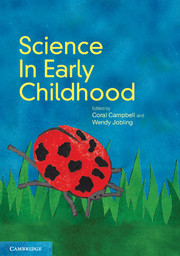Book contents
- Frontmatter
- Contents
- Contributors
- INTRODUCTION
- CHAPTER 1 SCIENCE IN THE NATIONAL EARLY YEARS LEARNING FRAMEWORK
- CHAPTER 2 LEARNING THEORIES RELATED TO EARLY CHILDHOOD SCIENCE EDUCATION
- CHAPTER 3 USING PLAY PEDAGOGY IN THE EARLY YEARS
- CHAPTER 4 TEACHING APPROACHES
- CHAPTER 5 DEVELOPING PEDAGOGICAL PRACTICES FOR SCIENCE TEACHING AND LEARNING WITH 3 AND 4-YEAR-OLD CHILDREN
- CHAPTER 6 EFFECTIVE SCIENCE LEARNING ENVIRONMENTS
- CHAPTER 7 LEARNING SCIENCE IN INFORMAL CONTEXTS: THE HOME AND COMMUNITY
- CHAPTER 8 ENVIRONMENTAL EDUCATION FOR SUSTAINABILITY AND ITS PLACE WITHIN SCIENCE
- CHAPTER 9 CATERING FOR CHILDREN'S DIFFERING NEEDS IN EARLY CHILDHOOD SCIENCE EDUCATION
- CHAPTER 10 PLANNING FOR SCIENCE
- CHAPTER 11 OBSERVING, ASSESSING AND DOCUMENTING LEARNING IN SCIENCE
- CHAPTER 12 PROFESSIONAL LEARNING – REFLECTIVE PRACTICE IN SCIENCE EDUCATION
- Additional resources
- Appendix
- Glossary
- Index
CHAPTER 12 - PROFESSIONAL LEARNING – REFLECTIVE PRACTICE IN SCIENCE EDUCATION
- Frontmatter
- Contents
- Contributors
- INTRODUCTION
- CHAPTER 1 SCIENCE IN THE NATIONAL EARLY YEARS LEARNING FRAMEWORK
- CHAPTER 2 LEARNING THEORIES RELATED TO EARLY CHILDHOOD SCIENCE EDUCATION
- CHAPTER 3 USING PLAY PEDAGOGY IN THE EARLY YEARS
- CHAPTER 4 TEACHING APPROACHES
- CHAPTER 5 DEVELOPING PEDAGOGICAL PRACTICES FOR SCIENCE TEACHING AND LEARNING WITH 3 AND 4-YEAR-OLD CHILDREN
- CHAPTER 6 EFFECTIVE SCIENCE LEARNING ENVIRONMENTS
- CHAPTER 7 LEARNING SCIENCE IN INFORMAL CONTEXTS: THE HOME AND COMMUNITY
- CHAPTER 8 ENVIRONMENTAL EDUCATION FOR SUSTAINABILITY AND ITS PLACE WITHIN SCIENCE
- CHAPTER 9 CATERING FOR CHILDREN'S DIFFERING NEEDS IN EARLY CHILDHOOD SCIENCE EDUCATION
- CHAPTER 10 PLANNING FOR SCIENCE
- CHAPTER 11 OBSERVING, ASSESSING AND DOCUMENTING LEARNING IN SCIENCE
- CHAPTER 12 PROFESSIONAL LEARNING – REFLECTIVE PRACTICE IN SCIENCE EDUCATION
- Additional resources
- Appendix
- Glossary
- Index
Summary
Objectives
The aim of this chapter is to:
provide understanding regarding the value of reflective practice
provide strategies to enhance professional learning
stress the importance of professional learning when planning science learning experiences.
Overview
Research has shown that educators need to engage in critical reflection so that they examine the judgements, interpretations, assumptions and expectations they have of themselves, children and learning (Hanson, 2011). This is particularly important in science education, where often the educator is learning the science curriculum alongside the children. Without reflection on their decisions and actions, modifications cannot made appropriately and learning experiences are less developed. This chapter discusses educators' professional learning, with particular reference to science in early childhood settings.
Introduction to reflective practice
Research into the early years of childhood over the past decade has highlighted the significance of wellbeing in early learning (Perry, 2006; Laevers, 2005). Incorporated into the EYLF (DEEWR, 2009) is a requirement that educators undertake ongoing reflective practice to ensure that all children in early childhood settings receive quality teaching and learning.
Reflective practice is a form of ongoing learning that involves engaging with questions of philosophy, ethics and practice. Its intention is to gather information and gain insights that support, inform and enrich decision-making about children's learning. (DEEWR, 2009, p. 13)
Kolb (1984) was one of the early users and advocates of a process he called ‘reflective observation’.
- Type
- Chapter
- Information
- Science in Early Childhood , pp. 177 - 189Publisher: Cambridge University PressPrint publication year: 2012



